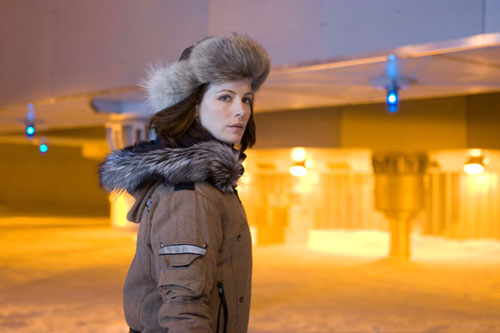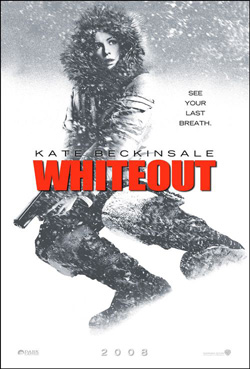The Greg Rucka Interview: Whiteout — From Comics To The Big Screen
 Created in 1998 by writer Greg Rucka and artist Steve Lieber, Whiteout tells the story of U.S. Marshal Carrie Stetko, who investigates a murder committed in the most out-of-the-way crime scene on Earth: McMurdo Station, Antarctica.
Created in 1998 by writer Greg Rucka and artist Steve Lieber, Whiteout tells the story of U.S. Marshal Carrie Stetko, who investigates a murder committed in the most out-of-the-way crime scene on Earth: McMurdo Station, Antarctica.
The film adaptation of the Eisner-nominated comic series was released in 2009 and, although it was neither a critical nor financial success, many fans found it to be a faithful and well-produced adaptation of the original material, Greg Rucka included.
PREVIEWSworld wishes to thank writer Greg Rucka, who took time out of his busy schedule to discuss his involvement with the development and production of the Whiteout adaptation for our Movie Month.
**********
PREVIEWSworld: Can you explain the initial process when you first started receiving interest in Whiteout being adapted to the big screen?
Greg Rucka: Steve Lieber and I received interest on Whiteout very early, actually — the book was optioned for the first time in 1999, then again in 2002. And once again in 2004, if I remember correctly. There were multiple attempts at a draft by different people, but I excused myself from the process almost immediately. At that point, I just didn’t have any interest in being involved in any adaptation. When Dark Castle finally came along and said they wanted to make a movie out of it, Steve and I had been through so many attempts already, we were kinda ‘okay, whatever.’ So I was honestly surprised when it turned out they were going to make the movie.

|
P: How involved were you during production of the film and how much of your time was spent on-set?
GR: Honestly, not that much. I was on set for a total of about three and a half weeks near the end of the production. I wrote a handful of character-based scenes in rewrite, only a few of which made it into the final cut of the film. But the actual filmmaking process, the writing, I really wasn’t involved at all, except as a courtesy.
P: Any memorable moments during the process?
GR: I can remember visiting the set for the very first time. It was the sound-stage they were using for Vostok, and they’d just called cut on a shot, and we were escorted into this huge, dark stage, with all these blowers running and fake snow fluttering in the air. And then Kate Beckinsale came out of the set, dressed as Carrie, wearing this little Russian hat, and I just stopped cold and stared. Up until that moment, I’d been thinking, ‘Well, Kate Beckinsale, not my first choice for a Carrie Stetko if anyone had asked me,” but when I saw her, the impression was just so immediate, it was as if Steve had drawn her.
There’s another moment, too, same visit. My kids came with me, and in between set-ups, Kate was showing them around the set. And she handed my son one of the fake pots from the Vostok kitchen set, explaining that she’d used it in this fight they’d shot. The pot was made out of plastic, and told him to hit her on the head. I have a picture of that; of my son hitting Kate Beckinsale on the head with a plastic frying pan!

|
P: Any favorite moments in the film that you felt really captured what you were trying to convey in the comic?
GR: My personal favorite moment is the amputation scene, because they were able to do on screen what Steve and I could never have done on the page — showing the actual procedure would have been ghoulish in the comic. But onscreen, the chemistry and the emotion of that moment, the conversation between Kate and Tom Skerritt, that was wonderful to see. It’s my favorite moment in the movie, and I think it’s the best scene in the movie. Tom Skerritt was stunning to watch work, he was so professional and so good, he literally is one of those actors you feel could read the ingredients on a can of Coke and it would be mesmerizing.
 P: Besides Whiteout, of course, what would be your favorite comic-to-film adaptation and why?
P: Besides Whiteout, of course, what would be your favorite comic-to-film adaptation and why?
GR: Heh. Honestly? I still think The Rocketeer is one of the best comic book movies ever made, even today. It’s such a terrific film, and it so beautifully captured not just the feel of Dave Stevens’ work, but the look as well. I can watch that film over and over again. It never apologized for what it was, it never pretended to be anything other than what it was, and it remains, to me, the perfect adaptation.
P: Of your other projects, which one would you like to see adapted into a film or television show and why?
GR: There are a couple. I still feel that Gotham Central would make a terrific television show, and I would love to one day see that come to pass (and would love to be involved if it did, obviously). But of my “creator-owned” work, I’d love to see Queen & Country be made, honestly, either as a television series, or as a movie. John Rogers wrote a brilliant adaptation that remains, today, a movie I would happily pay to see. And frankly, I think Stumptown would make a good television show. Seeing Dex on the small screen would be a huge thrill, and of everything I’ve written, it seems to me the best fit for a show.


